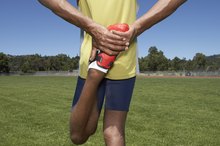What Are the Causes of Cramps in Feet?
A cramp is a sudden involuntary contraction of any muscle, including those in the feet, which can be extremely painful.
If you are experiencing serious medical symptoms, seek emergency treatment immediately.
A muscle cramp, commonly called a charley horse, occurs when the muscle cramps and does not relax, according to MedlinePlus. The muscle can get so tight it feels like a knot underneath the skin.
Although painful, muscle cramps occur in healthy people, but may be the result of an underlying disease or condition that requires medical treatment.
Exercise and Dehydration
Long periods of exertion or exercise, particularly in hot weather, can cause cramping in the small muscles of the foot.
According to the Merck Manuals Online, overusing a muscle, being dehydrated or having to hold the foot in one position for an extended time can cause cramping.
Spontaneous cramping of the foot and toes can occur at night while sleeping and is called a nocturnal cramp. Nocturnal cramps cause the foot and toes to curl downward. Stretching can bring relief, as it makes it less likely for muscles to cramp spontaneously.
- Long periods of exertion or exercise, particularly in hot weather, can cause cramping in the small muscles of the foot.
- Spontaneous cramping of the foot and toes can occur at night while sleeping and is called a nocturnal cramp.
- Nocturnal cramps cause the foot and toes to curl downward.
Underlying Disease
What Are the Causes of Leg & Foot Cramps?
Learn More
Most foot cramps are painful, but harmless, however, in some cases they can be the result of an underlying disease.
According to the MayoClinic, poor circulation to the feet can cause cramping while walking due to the muscles not getting enough blood supply from narrowed arteries. These cramps will go away with rest.
Other medical conditions that can cause foot cramps include:
- underactive thyroid, or hypothyroidism
- kidney disease, especially when on dialysis
- cirrhosis of the liver due to alcoholism
It is important to treat the underlying disease to relieve any cramping.
- Most foot cramps are painful, but harmless, however, in some cases they can be the result of an underlying disease.
Nutritional Deficiency
Certain nutritional deficiencies can cause foot cramps to occur. According to the MayoClinic, being deficient in some minerals, particularly potassium, can cause muscle cramps.
Too much or too little salt in the diet can cause cramping, as can reduced levels of calcium and magnesium.
Replacement of depleted minerals, under a doctor's advice, can clear up the cramping.
- Certain nutritional deficiencies can cause foot cramps to occur.
- Too much or too little salt in the diet can cause cramping, as can reduced levels of calcium and magnesium.
Side Effects of Some Medications
Cramping During Crunches
Learn More
Some medications can produce muscle cramps in the feet as a side effect and Foot Pain Explained states diuretics, also called water pills, can cause cramping to occur.
Other medications that can induce foot cramps include:
- statins - taken for high cholesterol
- lithium - taken for bipolar disorder
- cimetidine - taken for ulcer management
- terbutaline - taken for asthma.
Morphine withdrawal can also cause cramping. Speak with your doctor if you experience foot cramps as a side effect of your medication.
Pregnancy and Hormonal Changes
Foot cramps can occur more frequently in the second and third trimester of pregnancy. They may be the result of hormonal changes or an increase in retained water, which causes edema in the feet and ankles and decreased circulation.
Foot cramps during pregnancy tend to occur more at night, and Dr. Mary Marnach at the Mayo Clinic suggests getting up and walking to relieve the cramps and then elevating your feet. This may keep the cramp from returning.
- Foot cramps can occur more frequently in the second and third trimester of pregnancy.
- They may be the result of hormonal changes or an increase in retained water, which causes edema in the feet and ankles and decreased circulation.
Related Articles
References
- Medline Plus: Charley Horse
- Merck Manuals Online: Muscle Cramps
- Mayo Clinic: Muscle Cramp
- National Institute of Health: Night Cramps
- National Institute of Health: Pregnancy leads to lasting changes in foot structure
- Mayo Clinic: What Causes leg cramps during pregnancy and can they be prevented?
- American Academy of Orthopaedic Surgeons (AAOS). Muscle cramps.
- Rao S, Riskowski JL, Hannan MT. Musculoskeletal conditions of the foot and ankle: assessments and treatment options. Best Pract Res Clin Rheumatol. 2012;26(3):345-68. doi:10.1016/j.berh.2012.05.009
- Lorenzo M. et al. Treatment of nocturnal leg cramps by primary care patients over the age of 60. Family Practice 2018;35(1):29-33. doi:10.1093/fampra/cmx062
Resources
- http://orthoinfo.aaos.org/topic.cfm?topic=A00667
- http://orthoinfo.aaos.org/topic.cfm?topic=A00200
- http://www.nlm.nih.gov/medlineplus/ency/article/003194.htm
- http://www.nlm.nih.gov/medlineplus/ency/article/003183.htm
- http://www.merckmanuals.com/home/bone_joint_and_muscle_disorders/muscle_bursa_and_tendon_disorders/fibromyalgia.html
Writer Bio
Kathryn Meininger began writing and publishing poetry in 1967. She was co-founder and editor of the professional magazine "Footsteps" and began writing articles online in 2010. She earned a Doctor of Podiatric Medicine from Temple University School of Podiatric Medicine and a Bachelor of Arts in biology from William Paterson University.








